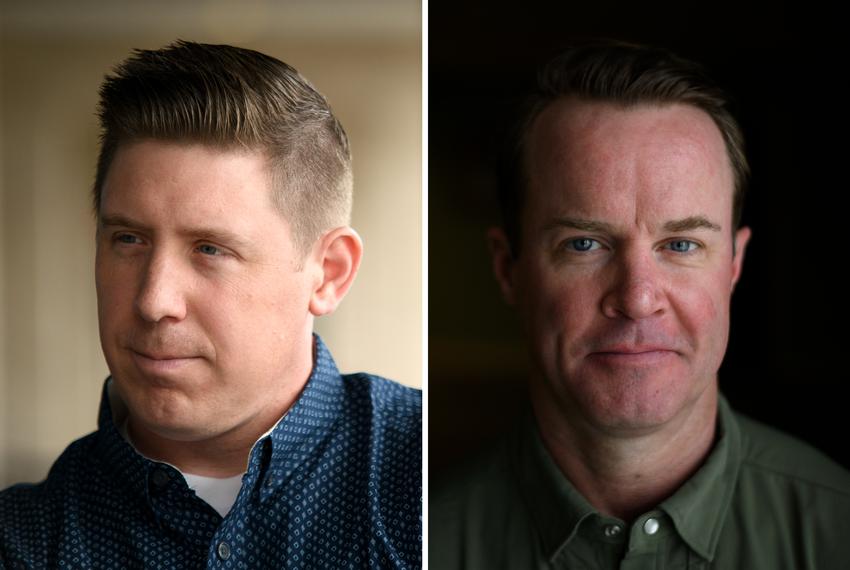Dade Phelan, House incumbents receive major fundraising boost from casino magnate

Sign up for the We the Texans newsletter to receive twice-monthly updates on our year-long initiative dedicated to boosting civic engagement and chronicling how democracy is experienced in Texas.
Under attack from the right, House Speaker Dade Phelan and his allies are outpacing their primary opponents in fundraising going into a heated May 28 runoff that’s pitting Republican incumbents against far-right challengers.
The incumbents saw key support from politically connected business groups and megadonors in recent weeks — capped by a surprise last-minute influx from Miriam Adelson, the owner of the Las Vegas Sands casino empire who is intent on legalizing her business in Texas.
Phelan, R-Beaumont, was pushed into an overtime contest after he finished second to GOP activist David Covey in a three-way March primary.
Covey raked in an impressive haul in his own right, raising some $1.7 million and spending nearly as much since late February, according to campaign finance reports due this week.
Once dismissed as a longshot, the 34-year-old oil and gas trader has won the support of Phelan’s high-profile political rivals, including Lt. Gov. Dan Patrick and Midland oilman Tim Dunn, a billionaire megadonor who is funding an aggressive campaign to oust Phelan and rid the party of so-called moderates.
Dunn’s new political group, Texans United for a Conservative Majority PAC, was one of Covey’s biggest donors in recent weeks, kicking in more than $400,000 during the runoff. Patrick donated $100,000, while Amarillo businessman Alex Fairly contributed $500,000. Fairly is the father of Caroline Fairly, who is poised to join the House after winning her Panhandle-based Republican primary in March.
The trio accounted for more than 60% of Covey’s fundraising in his latest finance report, which covered all campaign activity from Feb. 25 through Saturday.
That was not enough to match Phelan, who has raked in about $3.4 million and spent nearly $3.9 million over the same span, more than doubling up Covey. Phelan’s biggest backers included a who’s-who of the state’s usual GOP donor crowd — along with a significant boost from Adelson’s newly formed group, Texas Defense PAC. All told, he received more than $660,000 from Adelson and Texas Sands PAC, another group linked to the casino empire.
Adelson, who took the helm of Las Vegas Sands following the death of her husband, Sheldon Adelson, is among the wealthiest women in the country. She cut a $9 million check earlier this month for Texas Defense PAC — the group’s only source of funding.
The PAC also kicked in more than $400,000 to endangered GOP state Reps. Frederick Frazier of McKinney, Justin Holland of Rockwall and John Kuempel of Seguin. All three easily outpaced their runoff foes in fundraising and spending in the latest finance reports, thanks in part to Adelson’s support.
Adelson has pushed for legalized casino gambling in Texas for years, but her efforts have largely been thwarted by the Senate, where Patrick has been cool to the measure. Phelan is more receptive to the idea, saying at the start of last year’s regular session that he wanted to see “destination-style casinos that are high-quality and that create jobs.” He also noted that his district, tucked in Texas’ southeast corner along the Louisiana border, is “a stone’s throw” from casinos that are legalized across state lines.
Some of the GOP challengers on the other side of Adelson’s spending were quick to frame it as a tainted source of funding from an industry that some in the party oppose over concerns that it would stoke gambling addictions and attract crime. Holland’s opponent, former tea party leader and Trump spokesperson Katrina Pierson, derided Holland for being “funded by out of state billionaires.”
“If you’re a ‘Republican,’ and you’re taking hundreds of thousands of dollars from the casino lobby in the primary, you’re NOT the good guy. You’re a useful idiot,” tweeted Mitch Little, an attorney who recently ousted state Rep. Kronda Thimesch of Lewisville.
Last spring, supporters failed to gather enough votes in the House to authorize "destination resort" casinos in large metros areas. The proposal must clear the high bar — two-thirds support in both chambers — required to amend the Texas Constitution.
The chamber approved legislation last year to allow online sports betting, a key milestone in a state that has routinely shunned efforts to loosen its tight gambling restrictions, but Patrick swiftly shot down the proposal in his chamber.
Pierson, for her part, got more than three-quarters of her funding in the latest reporting period from Abbott's campaign and Dunn's PAC. Holland has also taken swings at Pierson over her campaign's support from Jeff Yass, the Pennsylvania-based GOP megadonor and TikTok investor whose priority issues include school vouchers.
Though Yass — labeled in Holland's attack ads as a "TikTok billionaire" — has not donated directly to Pierson’s campaign, he has contributed nearly $12 million to Abbott and a pro-voucher super PAC, AFC Victory Fund, that has also spent six figures backing Pierson.
Through late April, the super PAC — a political arm of the voucher advocacy group American Federation for Children — had spent about $100,000 apiece on ads attacking the four anti-voucher GOP incumbents who were forced into runoffs: Holland, Kuempel, DeWayne Burns of Cleburne and Gary VanDeaver of New Boston.
The full scope of pro-voucher spending remains unclear. AFC Victory Fund's latest finance report only goes through April 25, while another deep-pocketed voucher advocacy group, the Club for Growth, is a federal PAC that is not required to say how much it is spending on each race.
The Club for Growth, also a recipient of Yass' multimillion-dollar largesse, previously announced it had reserved $4 million in TV and radio ads with plans to target the same four Republicans, plus Phelan.
Yass kicked in another $400,000 to Patrick last month, pushing his political spending north of $12 million in Texas this cycle. He is outpaced only by Adelson, who has donated more than $4 million to the Texas Sands PAC on top of her other $9 million infusion.
Thus, Texas' two biggest political donors this cycle are residents of Nevada and Pennsylvania who have collectively shelled out $25.5 million. That's more than the next four — Dunn, Texans for Lawsuit Reform co-founder Dick Weekley, Democratic megadonor George Soros and H-E-B Chairman Charles Butt — combined.
Dunn was especially active in the latest reporting period, pumping more than $3.7 million into his PAC, which in turn spent more than $4 million targeting incumbents and backing Dunn's preferred candidates in open races. Its beneficiaries included Covey and Pierson, along with state Rep. Lynn Stucky's opponent, Andy Hopper; Helen Kerwin, who is challenging Burns; and Alan Schoolcraft, Kuempel's runoff foe.
It appears to be one of Dunn's biggest ever investments in the House primaries, dwarfing his spending from comparable periods through the 2010s, when he gained his reputation for wielding outsize influence in Republican primaries.
And yet, many of Dunn's targets in next week's runoffs reported bigger fundraising hauls than their far-right challengers — underscoring the sheer scale of the spending in this year's House contests. Riding to the incumbents' defense was the powerful tort reform group, Texans for Lawsuit Reform, which reported $4.5 million in spending since late February; and Associated Republicans of Texas, a longtime defender of GOP incumbents that spent about $1.9 million in the most recent period.
Early voting began Monday and ends Friday ahead of Election Day on May 28.
Voting FAQ: 2024 Elections
-
What other elections should I know about?
-
Are there rules at the polls?
-
What are my rights as a voter?
-
What if I was planning to vote in person, but I have been diagnosed with COVID-19 or get sick?
-
What can I do if I have trouble voting?
- Read more
We’ve got big things in store for you at The Texas Tribune Festival, happening Sept. 5–7 in downtown Austin. Join us for three days of big, bold conversations about politics, public policy and the day’s news.
Information about the authors
Learn about The Texas Tribune’s policies, including our partnership with The Trust Project to increase transparency in news.

